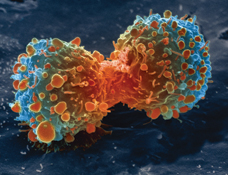Turning Discovery Into Health
Cancer

Colored scanning electron micrograph of a lung cancer cell during cell division.
NIH-funded research has inspired a revolution in how we think about cancer. Only 10 or 20 years ago, cancer treatment was mostly reactive, specific to a particular organ. Therapies were often difficult and associated with a poor quality of life.
Today, we are in a new era where cancer therapy is more proactive, targeted, personalized, and less toxic. Effective screening programs have saved thousands of lives.
Cancer is an enemy that requires attack from all sides. By studying the basic biology of cancer, scientists have made fundamental discoveries that have led to dozens of new drugs, including targeted treatments with few side effects.
In 2005, NIH-sponsored clinical trials showed that adding the drug trastuzumab to standard chemotherapy cut the risk of breast cancer recurrence by 40% for women whose tumors are genetically matched to this drug. This is the most dramatic improvement in the post-surgical treatment of breast cancer ever described.
Our understanding of genetic susceptibility to cancer has grown dramatically in recent years, thanks to new technologies developed for the Human Genome Project. Over 70 common genetic variants have been discovered that are associated with risk for 15 cancers to date, including cancers of the breast, prostate, colon, pancreas, brain, bladder, testis, and lung, as well as chronic lymphocytic leukemia and non-Hodgkin lymphoma.
In 2007—for the first time in history—the absolute number of cancer deaths in the United States went down.
Imagine the Future…
- Individualized risk prediction allows more rational application of screening procedures, enabling early detection and cure.
- Nanomedicine targets cancer cells precisely, with limited toxicity to healthy cells.
- Oncologists select cancer drugs based on the precise DNA changes in a person’s tumor.

 Cardiovascular Disease
Cardiovascular Disease Cancer
Cancer Depression
Depression Diabetes
Diabetes
Social Media Links